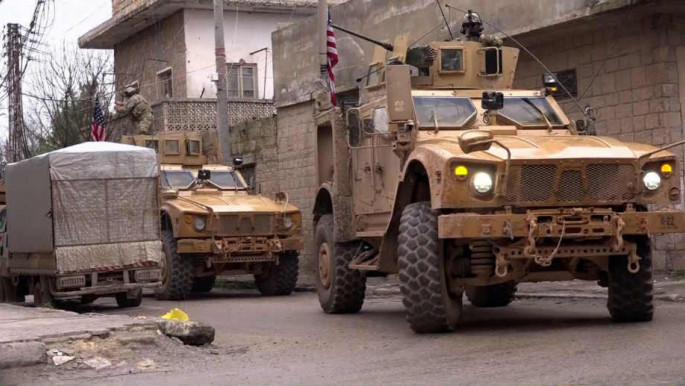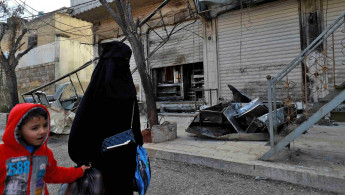Manbij bombing could become major propaganda coup for IS
The recent Islamic State group suicide bombings targeting US troops in northern Syria could give the group a much-needed propaganda coup. After all, the killings come as Washington is preparing to pull all of its forces out of Syria, a development which IS could soon spin as a victory to its beleaguered rank-and-file.
On Wednesday January 16, IS carried out a suicide bomb attack on a busy market street in the northwestern Syrian city of Manbij, killing 19 people, including four Americans. Two of those Americans were soldiers, the third was employed by the US Department of Defense and the fourth was a Syrian-American interpreter.
Then, on the following Monday, January 21, a vehicle-borne improvised explosive device (VBIED) targeted a convoy of US forces escorted by their Kurdish-led Syrian Democratic Forces (SDF) allies in the southern countryside of the Hasakah region in Syria's Kurdish-held northeast.
At least five SDF fighters were killed in the attack. While initial reports stated that two US troops were also wounded, the spokesperson for the US-led anti-IS coalition tweeted that there were no US casualties.
IS more likely than not carried out this latest attack with the intent of killing more American troops less than a week after the Manbij bombing.
 |
Shortly before these two attacks, US forces on the ground began moving equipment out of the country, a sign that the troops could soon follow |  |
While thousands of American troops were killed by suicide bombings of this kind throughout the Iraq War of the last decade it suffered comparably tiny troop casualties in its four-year campaign against IS. A total of four American troops were killed in the campaign against IS in Syria before last Wednesday's attack on Manbij.
This is largely a result of the heavy US reliance on airstrikes as well as its alliance with the SDF, which sacrificed thousands of its own fighters to rout IS from the cities and towns it occupied in Syria.
An estimated 2,000 American troops are presently in Syria, many of them special forces operators who have helped the SDF in its various offensives against IS.
 |
|
| US troops' withdrawal from Manbij is being spun by IS as a forced retreat in wake of fresh attacks [AFP] |
IS arguably scored a major propaganda coup with its attack on Manbij and the follow-up attack in Hasakah.
In a single day in Manbij, it killed more American personnel in Syria than at any time in the past four years and it did so after US President Donald Trump announced, on December 19, that he was pulling all forces out of the country.
The UK-based Syrian Observatory for Human Rights war monitor summed up the Manbij attack as "the first bombing of its kind by a suicide bomber targeting the Coalition since it entered Syria".
Shortly before these two attacks, US forces on the ground began moving equipment out of the country, a sign that the troops could soon follow.
In early January an IS missile attack in eastern Syria wounded two British soldiers and killed one of the Kurdish fighters they were embedded with.
Trump is certainly right in declaring that the physical grasp the Islamic State group held on territory - which once spanned huge swathes of eastern Syria and western Iraq and at its peak was roughly equal in size to the United Kingdom - is largely destroyed. What he has seemingly failed to grasp, however, is the fact that this doesn't mean the group itself is defeated.
It is badly battered and a mere shadow of its former self, but it is still nevertheless a formidable undefeated adversary.
Just last August the United Nations estimated that the group still had 30,000 members in both Iraq and Syria, including approximately 14,000 in the latter.
Now that IS no longer possesses an entity with physical territory to defend, they are arguably a much more elusive and unpredictable adversary. Between its conquest of Mosul in June 2014 and its loss of both Mosul and Raqqa in 2017, the group invariably fought its battles as a largely conventional force using conventional tactics, which ultimately resulted in it becoming hopelessly outgunned and losing its self-styled "caliphate".
Twitter Post
|
The fact it can now organise a lethal attack such as the one in Manbij, a city the group lost to the SDF all the way back in August 2016, aptly demonstrates the threat it can still pose as an underground non-state terrorist organisation.
As early as May 2016, Abu Mohamad al-Adnani, the group's now deceased propaganda chief, declared the group would remain undefeated even if its leader, Abu Bakr al-Baghdadi, was killed and its forces removed from all the territory upon which it built its tyrannical pseudo-state.
"Do you think, O America, that victory is by killing one leader or another?" he once asked rhetorically. In a clear reference to the group's previous incarnation as Al-Qaeda in Iraq, dating back to the 2007-12 period, he followed up by asking: "Were we defeated when we lost the cities in Iraq and were in the desert without any city or land?"
IS essentially declared war on the entire world four years ago. It has been bombed by most of the major world powers ever since and lost the vast majority of its territory. Some argue that the group intentionally worked to draw Western armies into Syria and the wider region so it could, essentially, portray itself as a righteous Muslim army combating the "Crusaders", a move they also likely hoped would have sparked some kind of broader clash of civilizations.
One Hadith proclaims that "The Last Hour" will come when the Romans land in Dabiq, where they would be confronted and defeated by an army coming from Medina. The fact that IS named its now-defunct flagship propaganda magazine after that small town in Syria was hardly coincidental.
A group that readily uses such imagery and symbolism could now be orchestrating a similar narrative to reinstill morale among its remaining members, who are now operating underground. By carrying out tit-for-tat bomb attacks against the Americans, such as the one in Manbij, as they are very publicly preparing to withdraw in the near future, IS can boast it has driven the US out of Syria - and once again begin plotting a resurgence.
Paul Iddon is a freelance journalist based in Erbil, Iraqi Kurdistan, who writes about Middle East affairs.
Follow him on Twitter: @pauliddon



